The post Banned Books & Bold Librarians appeared first on Arkansas Strong.
]]>In Arkansas and across the nation, book bans are becoming more common.
The American Library Association says there were almost 700 attempts to censor library materials nationwide from January to August, and more than 1,900 challenges of specific book titles.
In Saline County, Patty Hector said she was removed from her position as library director for not banning books.
She said a county judge and Quorum Court wrote a resolution advising her to pick out “harmful” books and move them so children couldn’t access them. Hector said her response led to her being fired.
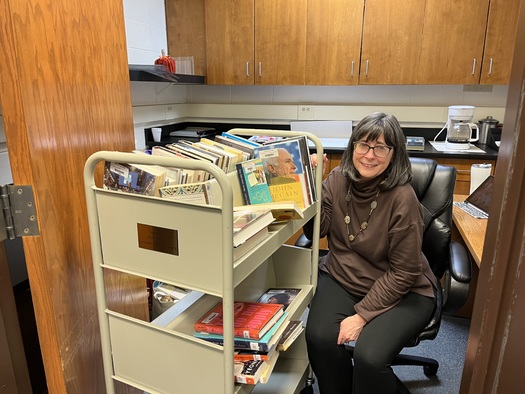
“There’s no place in the library that people can’t get to. So I said no, and then that was what got me in trouble,” she said. “I said no to them. And you don’t say ‘no’ to a bunch of men. And the books they picked out are LGBTQ and race – two-thirds of them are.”
As Hector described it, a resolution accusing her of fraud “was written by the Saline County Republican Committee.” She added that after the committee reported her for “violating the Freedom of Information Act 90 times,” she had to spend many months answering questions about her job and library expenses.
Hector said the committee also put up a billboard on Interstate 30 that said “Stop X-Rated library books, SalineLibrary.com.”
She said some Arkansas lawmakers worked to pass a bill that would criminalize librarians – but that law was blocked by a federal judge this year.
“Act 372 was going to make it a felony for a librarian to give anybody a book that’s ‘obscene,’ which they couldn’t define,” she said, “and that has been determined by a judge to be unconstitutional.”
Hector noted that several books with topics on sex education and homosexuality were under scrutiny. And a book entitled “The Talk”, about conversations that Black parents have with their children, was another title the committee objected to.
This story is brought to you by the Public News Service, an independent, member-supported news organization.
The post Banned Books & Bold Librarians appeared first on Arkansas Strong.
]]>The post ‘Debt-free pathway’ to college appeared first on Arkansas Strong.
]]>For many Americans, a college education is a luxury that feels worlds away. Even if there are multiple income-earners in their home. Even if they have enough cash to cover rent, utility bills and keep food on the table. Even if they don’t qualify for government assistance. Even so, the reality of paying for college can be hard to fathom.
The University of Central Arkansas is testing out a solution it says will largely eliminate financial barrier to a bachelor’s degree for families earning less than $100,000 per year. That could be crucial in a state like Arkansas, which has the 10th highest poverty rate and the third lowest rate of bachelor’s degree attainment in the country.
Given that Arkansas’ median income is $55,432 and 76 percent of households bring in less than $100,000 per year, university president, Houston Davis, believes the program will be able to help many students who wouldn’t otherwise be able to pay for college cover tuition and fees.
“Instead of a family saying ‘I’ve got a plan for how to pay for that for one year,’ we’ve got a plan for how you can pay for it for four,” Davis said. “We think that is a game changer. That is a change in the conversation around breakfast tables and dinner tables. And we think it’s what Arkansas families need to hear right now.”
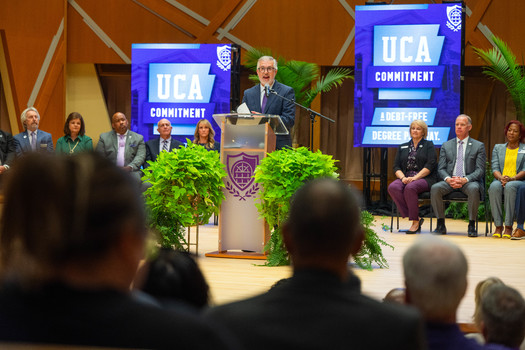
The program, called UCA Commitment, will be available to next year’s freshman class. To be eligible, students have to be Arkansas residents whose total family annual income falls below the $100,000 threshold. They also must apply for the merit-based Arkansas Academic Challenge Scholarship.
Once they have collected federal and state grants, the University of Central Arkansas will cover the rest with scholarships and work study assignments, Davis said.
Many states offer pathways to tuition-free community college, but such programs at the baccalaureate level are much less common, and typically provided at elite, deep-pocketed private universities, such as Harvard, Princeton, Stanford and Duke. For instance, Colgate University launched a similar program in 2021, which offered free tuition for students from families making less than $80,000, and replaced federal student loans with institution grants for students from families making less than $175,000.
The University of Central Arkansas is a far less selective institution, accepting 90 percent of all applicants. More than 40 percent of the student body qualifies for federal Pell Grants, meaning they come from a low-income family. As a regional university, many students come directly from the surrounding area, which includes counties with poverty rates above 20 percent.
The hope is that this program will remove the financial barrier for students who need it the most including those who may not see college as an option, said Khadish Franklin, managing director and team lead for the research advisory services division at education consulting firm EAB.
“You really need that for schools across the country, but in a state like Arkansas, and in a region like Central Arkansas, it is absolutely transformative for students,” Franklin said. EAB worked with the university to help develop the program.
For the 2023-2024 school year, tuition and fees for Arkansas residents costs $10,118, according to the University of Central Arkansas website. The scholarship won’t cover other costs such as textbooks, housing, food and transportation, which can add up to thousands as well.
Still, as long as they keep their GPA above a 2.5 and log at least 10 hours of community service per semester, students will be able to keep the scholarship for four consecutive years.
Davis said the university estimates that between 40 to 45 percent of freshmen will be eligible, or about 750 students in the fall of 2024.
The program is years in the making. About five years ago, leaders at the University of Central Arkansas considered the threats facing their school: The region faced a looming demographic cliff of college-aged residents and administrators were uncertain about what kind of state and federal funding they could count on in the coming years.
They began to ask themselves, “What were we going to do to be proactive?” Davis said.
To answer the questions, leaders pored through the budget to make sure that every dollar was going toward meeting the needs of students.
Part of that process was determining whether they were doing the best they could with student financial aid packages, Davis said. They worried about “over-awarding” some students, while other students who needed the money more weren’t getting it. They began drafting budgets to see whether they could make something like the UCA Commitment program work. After moving around some scholarship money and raising more money, administrators think they can swing it.
The new program doesn’t come at great risk to the college, either. Just because students won’t have to pay tuition, doesn’t mean the college isn’t getting paid. The money coming in for each student will be the same, it will just come from scholarships and work study assignments instead of college loans and credit cards.
Davis said the university expects to see a small increase in enrollment, but expects the most significant impact will to be on the number of students who return year after year.
“The real power of UCA Commitment is going to be for those students who are in academic good standing, they’re making progress toward a degree, but money is the reason they stop out,” Davis said.
Olivia Sanchez wrote this article for The Hechinger Report.
Support for this reporting was provided by Lumina Foundation.
The post ‘Debt-free pathway’ to college appeared first on Arkansas Strong.
]]>The post The Little Rock Nine (What Makes Arkansas Strong) appeared first on Arkansas Strong.
]]>Strength is not only the power to exact change, but also the endurance to persevere. There are many examples throughout Arkansas history in which we not only used our power to exact change, but powered through the adversity plaguing us with strike. The most prominent example that comes to mind is when the Little Rock Nine stood up against segregation, and started to integrate into Little Rock Central High School. They used their strong wills and powerful minds to go against social and political practices. Understanding that though the fight would be tough, the positive ramifications it would have on the next generations was worth the price.
That sort of selflessness and self sacrificial mindset is the embodiment of Arkansas strength. They were met with many threats against not only their lives, but of the lives of the people they hold dear. Unfortunately the threats did not just stop at verbal assault. Many of them, Like Ernest Green, were physically assaulted by their white classmates. Even amidst the violence, they did not stop persevering. They were able to use their strength to start the integration process, but the battle was far from over. In 1958, Little Rock high schools were closed for an entire academic year. An attempt to ice out the strong willed Arkansas, amidst the political, social, and legal controversy. But they did not back down, they remained headstrong and waited for their time to shine. In May of 1958, Ernest Green became not only the first African American student to take classes at Little Rock Central High School, but he also became the first African American student to graduate from there as well.
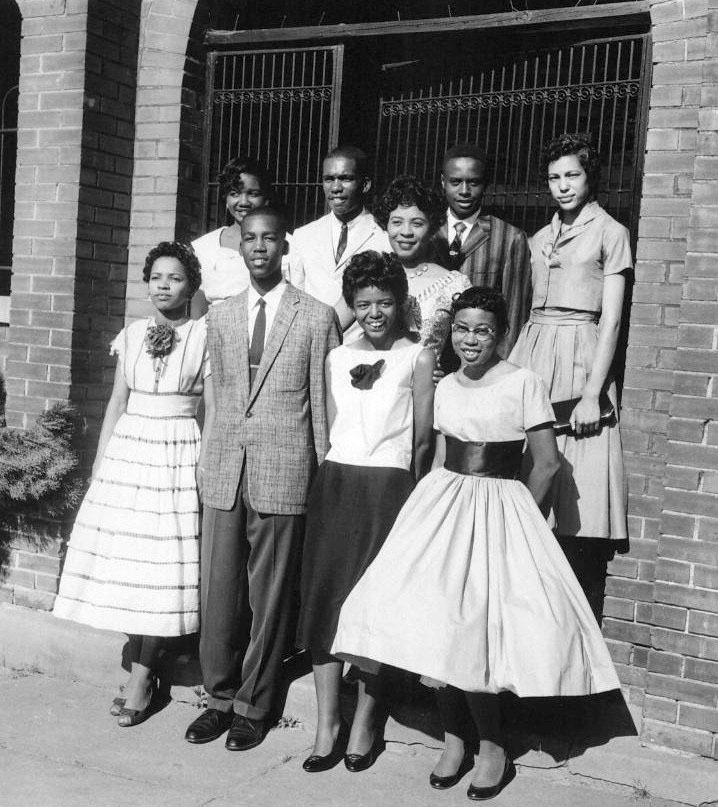
This cataclysmic moment became the first ripple in an ever changing title wave that swept the nation. Little by little, other districts, cities, and even states started to use the Little Rock Nine as a symbol for hope, and a symbol for change. This would not be the first or the last time that Arkansas has become a beacon for hope and an inspiration across the nation. In 1992, Arkansas native Bill Clinton was elected as President of the United States. Bill Clinton was able to take all the core values that Arkansans hold dear, and amplify them on a nationwide scale. During his presidency, the United States saw its lowest unemployment rate in the past 30 years. He was able to create more than 22 million new jobs. Just like the Little Rock Nine, he used his power to enact change. He ensured internet access to over 95 percent of all schools, he raised the educational standards, which increased reading and math scores on the SAT. Overall Bill Clinton and the Little Rock Nine are perfect examples of what make Arkansas strong. And that is the fact that Arkansans are strong willed and well mannered, always fighting to tackle injustices and inequalities they see. Arkansas is strong because it sees where change is needed, and becomes that change.
Works Cited:
“Te Clinton Presidency: A Historic Era of Progress and Prosperity .” National Archives and Records Administration, National Archives and Records Administration, https://clintonwhitehouse5.archives.gov/WH/Accomplishments/eightyears-01.html.
The post The Little Rock Nine (What Makes Arkansas Strong) appeared first on Arkansas Strong.
]]>The post The Search for Answers appeared first on Arkansas Strong.
]]>The Simpsons aspect is hilarious when thinking about it without that context. Every time he doesn’t understand a reference, which is of course multiple times in every episode, he searches the internet to help him get the joke. He’s 11 and hitting Wikipedia to search for the presidential election of 1912.
“What is the 8th commandment?“
“Who is Drederick Tatum?”
“Church of Jesus Christ of Latter Day Saints”
They should never, ever forgive us.
We should never, ever forgive ourselves.
He’s really into the musicals Rent and Six right now. Obsessed might be too strong of a word, but then again, it might not. We’ve been through phases of Hamilton and In the Heights and Come From Away, but right now it’s all Rent, which debuted in 1996, and Six, which takes place in the 16th century.
“Henry VIII bastard sons”
“Anne Boleyn”
“Mark Cohen’s sweater”
“Different kinds of sweater stripes”
But last Friday he searched for “March For Our Lives.” The day before that he searched for “Robb Elementary shooting”. The day before that he searched for “Arkansas school shooting.” And the week before that, before Uvalde, he searched for “Marjory Stoneman Douglas.” Before Uvalde. Before 19 more kids and two more teachers were shot and killed in another school shooting, my son was thinking about school shootings. And the week before that, he searched “grocery store shootings in Arkansas.”
He’s not going to bad sites. He’s not doomscrolling. He’s not scared to go outside. But he is acutely aware that these things happen. And happen with frightening regularity. And he carries that every day. At age 11.
It is incomprehensible to me that the trauma we are inflicting upon millions of kids through this omnipresent, background thrum of terror, hanging over them like the Sword of Damocles… that THAT isn’t enough for us to do something. THOSE KIDS, the victims of merely the threat of this scourge, should be enough to demand our immediate action.

It shouldn’t take dead children.
It shouldn’t take staggering statistics.
It shouldn’t take graphic, heart wrenching reporting.
Our kids Googling where they are most likely to get shot and killed, mixed in among their searches for Miranda Cosgrove and Top 10 Mario Games and funny cat memes… that should be enough. It’s incomprehensible that it’s not. That scores of actual dead children aren’t, either? Well, that’s just evil.
These kids are living on a planet that we are trying our hardest to destroy. We have enough resources to rid the world of hunger, and take a big bite out of poverty, but we just… don’t. They are getting a reprisal of the Cold War complete with the threat of nuclear winter. And on top of all that, their parents and grandparents, in what we love to call The Greatest Country in the World, refuse to take even the very first step toward stopping this plague of our own making.
They should never, ever forgive us.
We should never, ever forgive ourselves.
The post The Search for Answers appeared first on Arkansas Strong.
]]>The post The Art of Teaching appeared first on Arkansas Strong.
]]>I did not expect to grieve so much. The year ended not with a bang but a whimper. There was no closure. It just suddenly stopped. There were many tears during that first year. I missed my students; still do. I missed my school colleagues; still do.
I did not expect to have insomnia. My body apparently forgot how to sleep when it wasn’t “teacher tired.” It has taken a lot of time and effort to re-wire myself.
I did not know that my knees and ankles would not improve much once I was no longer on my feet all day, but here we are.
I still worry about those kids who needed me, especially the ones whose lifestyles or identities were judged harshly by most. I especially worry about the gay students who may not have someone to support them. It’s a very lonely, scary existence to be different in any way in high school. If your sexual identity does not match the prevailing community standards, the consequences can be brutal. I never overtly singled them out or tried to make them talk about it, but always hung close, kept an eye on them, and made sure they knew I accepted them. Numerous times over the years I’ve stepped in when they were being bullied. Who will be there for them?

Art is not just a class in which you learn to master certain skills and materials. It is a process that, when taught appropriately, reaches into the deepest levels of consciousness.
I profoundly miss those days in the classroom when a student had an “aha” moment. As an art teacher my importance in the school was usually related to how good Homecoming and prom looked, but the core of my purpose was crystal clear to me when a kid realized they had created something meaningful that they did not know they could do. Art is not just a class in which you learn to master certain skills and materials. It is a process that, when taught appropriately, reaches into the deepest levels of consciousness. I considered my career to be a journey of self-discovery and spiritual growth for myself as well as my students. It is part art therapy, part imagination journey, part relaxation, part skill mastery, part whimsy, part problem solving, and a lot of perseverance.
All art is self-portrait. To think of it only as decorating for events, although those are also important, is to completely miss the true value of arts education and those who teach these classes. People have been creating and imagining for thousands of years. Long before they developed language and numerical skills humans were painting on cave walls and making utilitarian or aesthetically pleasing objects that expressed their values. They give us an understanding of ancestors and culture. Creativity is at the core of what makes us human. A good art teacher needs this sense of history in order to fully appreciate how fundamental it is to our existence.
Yes. I really am that passionate about it. You may see a childish rendering of a daisy, but I see a small glimpse into something that intrigues that child. They may have spent hours thinking about daisies and how perfectly God created flowers. Art matters. Teaching is not just a job.
Retirement is not without its special charm however. I had always looked forward to the lack of morning chaos. Getting up and ready for school was a challenge my whole life. Arriving anywhere on time–major challenge. Now my mornings are usually quite enjoyable. I can sip coffee for as long as I want. Having that gentle buffer into the day is one of life’s simple pleasures.

I had also looked forward to not having to rush around all day, then go back later for ball games, conferences, school programs, special events, etc. These days it’s hard to pry me out of the house after 5 o’clock in the evening and I’m ok with that.
Most teachers I have known in my career have so much grit, dedication, and love for their students that they would walk through fire for them.
As a retired teacher I reflect on all those years, starting as a naïve twenty-something who had actually hated high school. I saw myself in the kids who felt the same. They sat at the back of the room, sleeping or watching suspiciously, guarding themselves by acting out or withdrawing. I felt my sense of purpose and commitment grow quickly when I realized that they were a big part of the reason I was there. I hope that my presence in their lives made a difference. I believe it did.
Most teachers I have known in my career have so much grit, dedication, and love for their students that they would walk through fire for them. Teaching has always been a demanding profession because in order to do it well you must be all in, heart and soul. Teachers work from instinct as much as lesson plans. Maybe more. They constantly monitor and adapt what they are doing and how they interact with children. They know when to throw out the lesson plan and take an interesting detour. Teaching absolutely cannot be quantified or judged based on data alone. Children deserve to be evaluated as whole people, not by test scores. The obsession with constantly changing technology is gutting education by not allowing the time needed for teachers to do what they know is best for their students. Endless data evaluation, strict pacing guides, test prepping, and micro-managing of content do not improve education. Educators improve education.
Growing pressure from radical groups demanding to know every single detail in a year of lesson plans, months in advance, are making a challenging career almost impossible. The narrative has become increasingly negative, and paints an unrealistic picture of what is happening in Arkansas public schools. A small but vocal minority of people would have us believe that schools are a hotbed of subversive troublemakers. Nothing could be further from the truth. In recent years teachers have had to grow a thicker skin than ever before. The barrage of criticism has become a very heavy burden. Young teachers are leaving the profession in disillusioned droves. Veteran teachers like myself are retiring heartbroken because we do not know who will be there for our children in the future.

Too many people in decision-making positions do not understand any of this. They continue to beat the same drums, demanding more from educators while offering no additional compensation or respect. Any governor or commissioner of education should be in constant contact with those in the classrooms who work with the students every day. They should come out from behind their office doors and go into communities to listen and learn. There should be a seamless two-way system of communication with school employees so that ideas can flow freely. State governments spend millions of taxpayer dollars on companies and consultants peddling “the next best greatest thing.” These programs claim to solve problems perceived to be present in public schools. These companies and consultants exist to make a profit. I propose that we change course entirely. We should convene groups of highly trained professionals with advanced degrees and many years of experience who know exactly what education should look like. If the pandemic experience has taught us anything, it is that teachers have proven that they possess the organizational skills and the vision to make education happen under the most impossible circumstances. Imagine what they could do under optimal circumstances, provided with adequate time, space, and compensation. That is how you improve education.
There is no more valuable resource than our future adults. They deserve the best education that we can give them…one that does not come from outside companies. It comes from teachers. History will judge the decisions we make today. Isn’t it time that we made the right one?
The post The Art of Teaching appeared first on Arkansas Strong.
]]>The post Arkansas Voices Essay Contest appeared first on Arkansas Strong.
]]>We are all part of the great story that is unfolding in Arkansas— a story of hope, unity, and strength. Join our Arkansas Voices Young Writers contest and add your voice to the story of Arkansas. What do you think makes Arkansas Strong? We want to hear your story!

Who: Any Arkansas student in grades 10-12 this current school year, 2021-2022, may participate in the contest
What: Write an approximately 500-word essay that answers the question “What Makes Arkansas Strong?”
When: Deadline is June 1, 2022
Where: Send as a Word document via email to contest@arstrong.org
Why: We want to hear what you consider strengths of our state, so we can celebrate those things and promote your unique voice
How: By publishing your essay on our website, www.arstrong.org, as well as honoring the state’s finest student writing with cash awards:
CONTEST PRIZES:
Grand Prize: $1000
Second Place: $500
Third Place: $250
Arkansas Strong advances a more responsible and resilient Arkansas by informing the public about issues facing our people, lifting up the stories of everyday Arkansas heroes, and promoting the values that make our state special.
The post Arkansas Voices Essay Contest appeared first on Arkansas Strong.
]]>The post Come to the Table appeared first on Arkansas Strong.
]]>I was inspired by your article today to write a note to you. I don’t usually do this sort of thing; I try to ignore politics since I hate it so much! However, I find myself wanting to let you know how much I agree with you. I’m neither conservative nor liberal – I’m pretty much in the middle, but I seldom find anyone else in that position. There’s always another way to look at things, I believe, and we should always consider the other side (which doesn’t seem to be a common practice in this time). For instance, I am a devout Catholic who firmly believes that abortion is sinful. I would never consider it myself and hope my children are the same. (I’ve had eight pregnancies and 9 children with my husband of 60 years who died in 2013.)
However, an experience I had as an assistant principal at Pine Bluff High School in the 60’s caused me to consider the other side. My office had a sweet, smart, young girl as our monitor – 15 years old and a sophomore. One afternoon as she was walking home from school, she was accosted by a man in the alley as she passed and was raped. Humiliated and ashamed, she told no one, not even her mother. Later on, she missed her period and told her math teacher in tears. I drove her to the lab where her pregnancy was confirmed.
When we got back to the high school, I called her mother who promptly picked her up and took her for an abortion. I hate to say it, but I was immensely relieved, because her life as she expected it was not ruined by this criminal experience. Ever since then, I have hoped for another way to address this situation for others, and even though Catholic, I cannot protest for the complete end to abortion.
I have been retired from education for 18 years and so grateful! Thank you for reading this email!
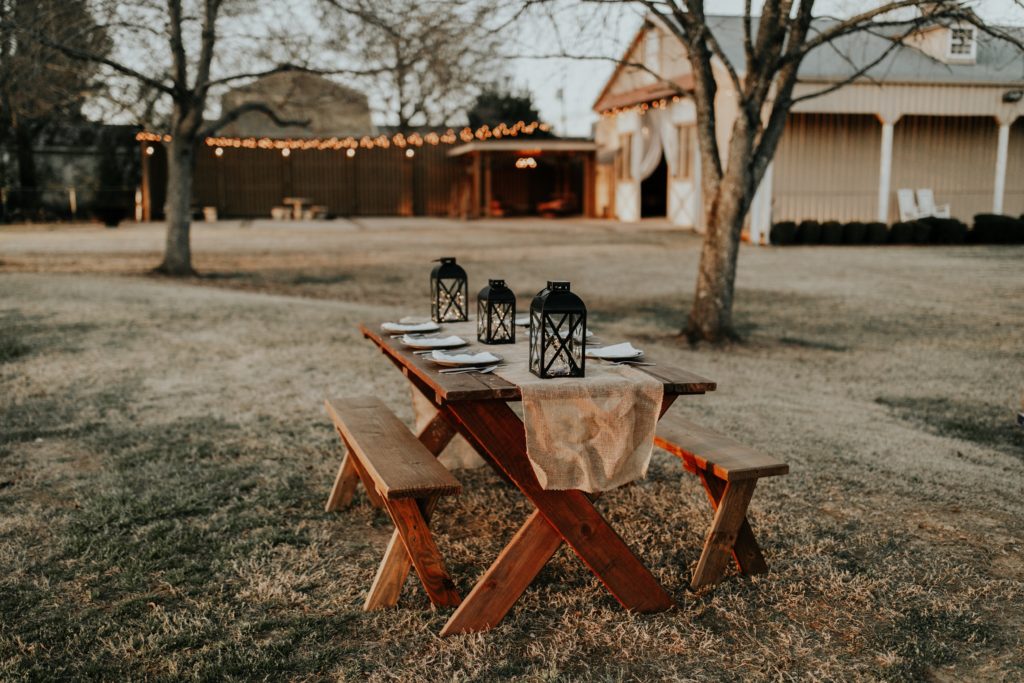
I so appreciate her perspective. It’s remarkable to me for many reasons. This person—a moderate, or centrist—feels like she is alone in the middle of the political spectrum. She’s elderly, married 60 years in 2013. A mother of 9. Devout Catholic. Highly educated; her signature included a doctorate. Retired educator. She witnessed this tragic thing in the 60s, before abortion would have been legal in Arkansas. Roe v Wade was decided in 1973.
I can relate to feeling lonely in the middle, although I believe there are many more of us than anyone realizes. I can relate to being married a long time, though not 60 years yet, and having a lot of children, though a lot for me is four. I can also relate to having spiritual reasons for hating abortion and believing I could not emotionally survive it myself.
As a fellow educator I understand seeing things, bearing witness at times to intimate details of people’s lives. My students have taught me a great deal about worlds as foreign to me, personally, as another planet: the worlds of poverty, abuse, and crime; worlds with very little agency or access or options. It is in my role as a teacher that I am constantly confronted with the heartbreaking nuances of things that might otherwise, from my limited experience, seem black or white.
We need this woman’s story. We need people like her at the table in Arkansas, weighing in on how we make policies that affect our citizens. We need the wisdom of her age and experience as an individual, mother, and school administrator.
The vision of Arkansas Strong is to amplify voices like hers. May this be the place all voices in Arkansas are heard. May this be the place this reader is not alone, but brings her unique strengths and finds others who strengthen her. May we be the table set for everyone to gather, together, and make Arkansas Strong.
The post Come to the Table appeared first on Arkansas Strong.
]]>The post What a Teacher Should Be: Celebrating the Life of Mrs. Braswell appeared first on Arkansas Strong.
]]>It was her ability to teach combined with her love for us that made learning in her class so much fun. She inspired me to want to learn more.
The year was 1973. I was about to start the second grade at England Public Elementary School. That year, I was blessed to be assigned to the classroom of Mrs. Helen Bess Braswell.
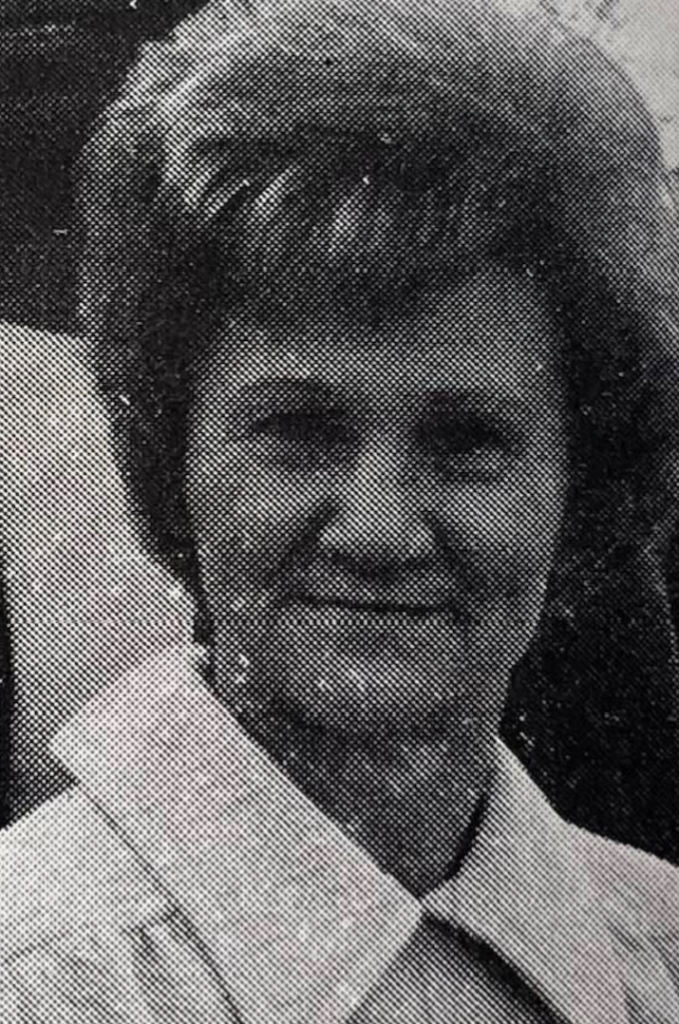
Mrs. Braswell had as great an impact on me and my education than just about any other teacher I have ever had before or since. It is hard to put into words how special she was to me and what she means to me still.
Mrs. Braswell was incredibly intelligent. We hope all our teachers are, but she was truly at the top. But it wasn’t just her special knowledge that made her special; it was her gift for teaching that knowledge to children that set her apart from most. She taught me how to write in cursive. She taught me phonics. I could go on and on. So many of the foundational blocks of my entire education I received from her. I can’t thank her enough.
I think I was drawn to her because Mrs. Braswell was always such a happy, positive person. Children can pick up on who is kind, who cares about them. That Mrs. Braswell loved her students was never in doubt. She had a cute smile and always a twinkle in her eye. She always had a hug for us when we needed it and encouraging words when we needed them.
It was her ability to teach combined with her love for us that made learning in her class so much fun. She inspired me to want to learn more. I have been fortunate to have many wonderful teachers, but Mrs. Helen Bess Braswell will always be at the top for me. Mrs. Braswell is the definition of what a teacher should be.
This picture is from the 1973-74 England yearbook when I had her as a teacher.
The post What a Teacher Should Be: Celebrating the Life of Mrs. Braswell appeared first on Arkansas Strong.
]]>The post We Are Still Here appeared first on Arkansas Strong.
]]>
I have never been to Burma but my parents were originally from Burma. We are Karen.
Karen is the third largest ethnic group population in Myanmar. Many Karen have migrated to Thailand, settling mostly in the border of Myanmar and Thailand due to the conflict caused by the Burmese military. The conflict has been described as one of the world’s longest running civil war and the Karen nationalist have been fighting for an independent state known as Kawthoolei more than 70 years since 1949 and counting. Most of the Karen people lost their homes, families, and lives.
The Burmese army try to kill Karen people and want to erase our culture because they don’t like us. To them we are their enemy and every time when they catch our Karen people, they rip our clothing and kill us. Burmese soldiers want more territory. They want the Karen village of Kawthoolei and use violence and genocide against Karen men, women, and children to get it. If furious Burmese soldiers see our clothes, they take them all away. When they come through our villages, they rip the clothing off the lines and torch them. They disrespect our culture. The Burmese army general Shwe Maung said “In twenty years, you will only be able to find Karen people in museum.” They also tell other countries that Karen land does not exist because they fight us and take it away, since my grandpa was born.
My parents told me that wherever I go, do not forget where I came from.

Because of this conflict, my family was forced to flee to Thailand, where I was born in a refugee camp. My parents tried their hardest to put food on the table while living in Thailand, despite the fact that it was still difficult. My parents have low-wage occupations.
The difference between living in Burma and Thailand is that we have to go hungry and fear the Burmese military in Burma. But in Thailand, we never go hungry, and we never have to worry about the Burmese military pursuing us.
In Thailand, it is necessary to pay to attend school. As a result of our modest income, my parents made the decision to relocate to the United States in 2014 in order to offer a solid education for their children, as well as a healthy life choices. My parents moved to the United States as part of a special migrant worker program. They could come and sacrifice themselves for their children, so that we will grow up with wonderful knowledge instead of growing up in the jungle without education.
My future plan is to make my parents proud. I want to accomplish my goals. I will allow myself to chase my dream that I believe in. Someday, when I get old, I want to be a wise person with knowledge. I will help my Karen people that are left in my country.
Even after all we have been through, the Karen dream of having their own independent state is still flourishing. I am just a young girl but I decided I could fight back against those who want to destroy us—by preserving out traditional clothing. Even though we do not have our own country, our culture is a very crucial part of us. Culture gives us identity and helps us grow our character. Personally, our traditional clothes have a huge impact on our people and the culture as it represents who we are as a nation.
There are different types of Karen traditional clothes in many categories, such as the black Karen traditional shirt with sarong for a married woman. White Karen traditional dresses are for women who are not married. For the men, they wear a Karen traditional shirt with longyi. Karen traditional clothes are kept as a treasure because they are delightfully handmade with very good quality. The skills that Karen people have are unique. Wearing the clothing makes me feel comfortable and good. It makes me look pretty and proud of my culture. I am who I am, and I don’t have to fit in. I embrace my culture it reminds me where I came from. Karen clothing is part of Karen culture because our ancestors represent our culture and where we are from. The traditional clothing is very special gift that has passed in from our ancestors. So, we maintain these attractive clothes and pass them on another generations that lies ahead of us. As long as we do this, Karen culture survives on Earth, in defiance of our murderers.

Karen are so few; we are not very well known, nor are our traditional clothes. Women wove more Karen clothes to pass to a new generation, so it can be known permanently. We celebrate the Karen new year by wearing Karen traditional clothes. Everyone who went to Karen new year wore Karen culture clothes.
So we maintain these attractive clothes and pass them on another generations that lies ahead of us. As long as we do this, Karen culture survives on Earth, in defiance of our murderers.
Share on X
I learned that these clothes are what make me stand out; they’re what my parents always wear. My great-great grandmother always wears Karen clothes everyday. There is not a day that goes by where she isn’t wearing it. So, a way to fight back is to keep wearing Karen shirt, never stop wearing it everywhere for Karen holidays. A way to say “we are still here” is to speak up about what happen in Kawthoolei. My friends and I shared our traditional clothes with our friends of different races and teachers in Arkansas at our American school. They are unknown clothes but are the most beautiful traditional clothes, because it describes where we came from. My parents told me that wherever I go, do not forget where I came from.

The post We Are Still Here appeared first on Arkansas Strong.
]]>The post A Tale of Two Students: The Gift of Public School appeared first on Arkansas Strong.
]]>It was the best of times for Grace. She was born into a loving family where both parents have graduate degrees and well-paying jobs. They’ve been married to each other for 26 years, live in a beautiful home on several acres, and have lots of books on their shelves. They even have a grand piano. Grace takes lessons.
Grace’s mom takes her shopping for all of the latest styles and lets her pick out school supplies. Her dad helps with math homework. They have plenty of healthy food and most nights the family sits around the table together and talks about their day. At night, after a nice bubble bath, Grace’s parents read her a Bible story and tuck her into bed. She gets a good night’s sleep. In the mornings Grace’s dad makes a hot breakfast, mom packs her lunch, and she rides to school with her aunt, a teacher who lives next door.

Photo by Marco Becerra.
Grace’s parents go to conferences with her teachers. They hold her to high standards. Grace works hard and takes advantage of all of the great things her public school offers, and graduates as Valedictorian with 30 hours of concurrent college credit. She becomes a National Merit Finalist, gets the Governor’s Scholarship, and goes to the University of Arkansas on a full ride. Her long-term goal is to attend law school and move back to her small town to raise a family and practice law.
The Worst of Times for Justin
The other student we’ll call Justin. He’s the same age as Grace but it’s the worst of times for him.
Justin doesn’t know his dad and his mom, who had him at 16, is on drugs. He lives with his two younger siblings way out in the mountains in an old shack with his disabled grandmother. Their yard is full of trash—old cars, rusty appliances, and broken toys. Two skinny dogs languish on chains.
“It’s time for patriotic Arkansans, we who believe in the American Dream, to stand together and stand strong for Arkansas children“
Justin sleeps on the couch. He squirrel hunts so the family has something to eat for supper. His grandma doesn’t get her check for a few more days. There are three potatoes on the floor and an onion in the fridge; old grease for frying the squirrels. That is all. If it weren’t for free breakfast and lunch at school the kids would be starving. Some church in town sends them home with backpacks of snacks over the weekend.
Justin’s pants are too short and his shirt is stained. His shoes have holes. He doesn’t own a coat to wear in winter. But every morning a big yellow bus rumbles down his dirt road, stops to pick him up, and takes him to school. School is warm in winter and cool when it’s hot outside. Justin feels safe there. Although he goes to bed hungry, doesn’t sleep well, and Grandma has never read him a story, every morning Justin walks through the same door to the same classroom as Grace. He sits at the same table with the same books. All day they both interact with the same highly trained certified teachers. Because Justin was screened for dyslexia when a teacher noticed difficulty reading, Justin gets explicit, direct instruction from a dyslexia specialist. Justin’s favorite class is shop, where he’s discovered he has a knack for welding. Justin is good with his hands.
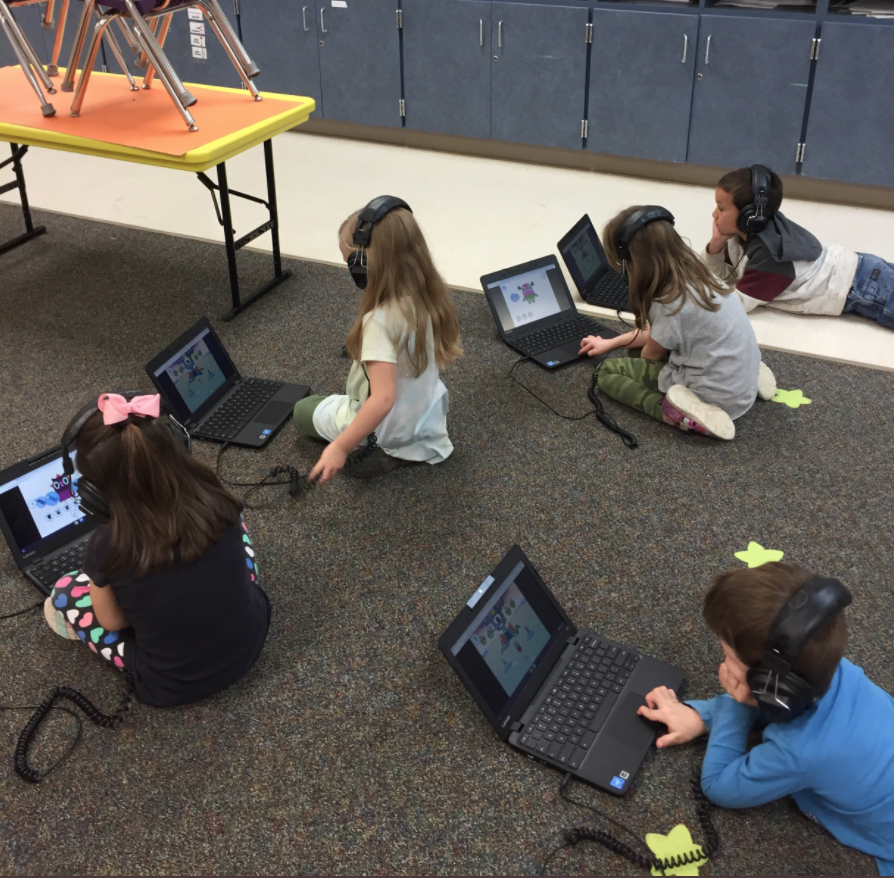
Justin eats a hot lunch, goes to Math lab for extra help with Geometry, and plays football where he’s part of a team. His coach is a good man who encourages him to do well in school and checks his grades every week. Because Justin works hard and takes advantage of the great things his public school offers, Justin graduates and receives his high school diploma. The school counselor helped him fill out a FASFA, so he gets financial aid to attend the local community college where he plans to become a welder. He’ll have a good job waiting as soon as he’s certified. Justin’s long-term goal is to get a place of his own and help his siblings make it through school.
Public School: the Great Equalizer
This story may sound outlandish to non-rural readers, maybe even rural non-public school teachers and staff. But these students are not fictional. They are actual people. The people our schools serve every day. Grace’s name has not been changed—she’s my daughter—and Justin, whose name is not Justin, was a player on my husband’s football team. Both are Ozark Hillbillies, though they could be from any school in rural Arkansas, which is to say the vast majority of schools in Arkansas.
In a rural state where over 66% of kids qualify for free and reduced school lunches, there are a great many more Justins than Graces. It’s the public school system more than anything else that brings them together and offers equity. It’s the one place they are guaranteed to stand on common ground. Justin didn’t choose to be born into poverty any more than Grace chose the middle class. But because of school—miraculous, generous, beautiful, American public school—Justin can get out. Public school is his ticket to the American Dream.
Why Funding Public School Matters
Bills circulating in our legislature right now would void that ticket for the most vulnerable children among us—those in poverty, those with special needs, those with learning and physical disabilities—all of whom public schools are required by law to accommodate, whatever extra space, staff, and equipment are required. While voucher pushers promote their bills as supporting low income families and those with special needs, that’s a smoke screen for the real reason: corporate greed. Recently a bill was debated in the Arkansas House and marketed as a “scholarship” program to benefit underprivileged kids, although the income cutoff is higher than the average family income in Arkansas. Lobbyists paraded parents of children with disabilities—a total of two–lucky enough to receive one of these “scholarships,” to testify how their children benefited from private school experience. My heart goes out to them. But their sincere anecdotal experience fails to negate the fact that hundreds of thousands of rural students are harmed in states that funnel public tax money to vouchers. We don’t need that rip-off in Arkansas. Yet the bills are such wolves in sheep’s clothing most voters have trouble understanding the consequences.

To be plain, the way the scam works is that rich people receive tax credit for every dollar they put toward the fund to pay for private school vouchers. This means they can choose to pay tax only to support private school vouchers. It would be like if I passed a bill that set up a fund to pave my mile-long dirt driveway. Regular taxpayers—the ones who fund our shared public highways–would credit me dollar-for-dollar even though I’d never let anyone use the private road but my family and friends. Sticking with this comparison, I’d argue the legislature should do it because it would really help my family—we can’t otherwise afford a paved driveway–and it’s such a tiny amount of money no one would miss it. Of course, the most recent school voucher bill allows the fund cap to rise 25% per year. So in 10 years we go from that insignificant amount to 37 million. And in 25 years it rings up at over a billion dollars siphoned away from public schools.
The American Dream of Public Education
If this happens, the Graces of the world might have to move to an urban area, but they’ll likely be okay. They have networks of support to help them. The biggest losers are the least of these—rural children who have no transportation or parental support or ability to navigate the system that makes private school in a larger town an option. There are no real options for them but the public school. And as it loses more and more funding, the quality goes down. Less money means less teachers, bigger classes, run-down facilities, old technology, and fewer supplies. Instead of the great democratic space that convenes diverse community, schools become segregated into rich and private, public and poor. Special interest groups grow fat like dog ticks sucking the public revenue dry. Rural districts ultimately don’t survive, and the 66% of students who are Justins fall through the cracks, likely perpetuating the cycle of poverty.
It doesn’t have to happen—not here. But it’s time for patriotic Arkansans, we who believe in the American Dream, to stand together and stand strong for Arkansas children. Which means we stand up and fight for our public schools.
The post A Tale of Two Students: The Gift of Public School appeared first on Arkansas Strong.
]]>